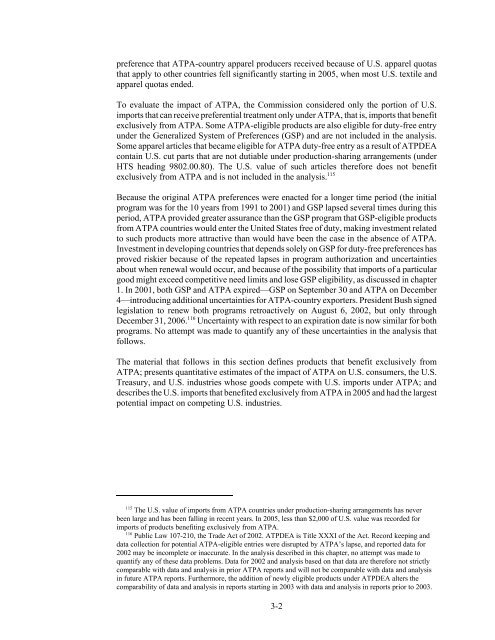The Impact of the Andean Trade Preference Act Twelfth ... - USITC
The Impact of the Andean Trade Preference Act Twelfth ... - USITC
The Impact of the Andean Trade Preference Act Twelfth ... - USITC
- No tags were found...
You also want an ePaper? Increase the reach of your titles
YUMPU automatically turns print PDFs into web optimized ePapers that Google loves.
preference that ATPA-country apparel producers received because <strong>of</strong> U.S. apparel quotasthat apply to o<strong>the</strong>r countries fell significantly starting in 2005, when most U.S. textile andapparel quotas ended.To evaluate <strong>the</strong> impact <strong>of</strong> ATPA, <strong>the</strong> Commission considered only <strong>the</strong> portion <strong>of</strong> U.S.imports that can receive preferential treatment only under ATPA, that is, imports that benefitexclusively from ATPA. Some ATPA-eligible products are also eligible for duty-free entryunder <strong>the</strong> Generalized System <strong>of</strong> <strong>Preference</strong>s (GSP) and are not included in <strong>the</strong> analysis.Some apparel articles that became eligible for ATPA duty-free entry as a result <strong>of</strong> ATPDEAcontain U.S. cut parts that are not dutiable under production-sharing arrangements (underHTS heading 9802.00.80). <strong>The</strong> U.S. value <strong>of</strong> such articles <strong>the</strong>refore does not benefitexclusively from ATPA and is not included in <strong>the</strong> analysis. 115Because <strong>the</strong> original ATPA preferences were enacted for a longer time period (<strong>the</strong> initialprogram was for <strong>the</strong> 10 years from 1991 to 2001) and GSP lapsed several times during thisperiod, ATPA provided greater assurance than <strong>the</strong> GSP program that GSP-eligible productsfrom ATPA countries would enter <strong>the</strong> United States free <strong>of</strong> duty, making investment relatedto such products more attractive than would have been <strong>the</strong> case in <strong>the</strong> absence <strong>of</strong> ATPA.Investment in developing countries that depends solely on GSP for duty-free preferences hasproved riskier because <strong>of</strong> <strong>the</strong> repeated lapses in program authorization and uncertaintiesabout when renewal would occur, and because <strong>of</strong> <strong>the</strong> possibility that imports <strong>of</strong> a particulargood might exceed competitive need limits and lose GSP eligibility, as discussed in chapter1. In 2001, both GSP and ATPA expired—GSP on September 30 and ATPA on December4—introducing additional uncertainties for ATPA-country exporters. President Bush signedlegislation to renew both programs retroactively on August 6, 2002, but only throughDecember 31, 2006. 116 Uncertainty with respect to an expiration date is now similar for bothprograms. No attempt was made to quantify any <strong>of</strong> <strong>the</strong>se uncertainties in <strong>the</strong> analysis thatfollows.<strong>The</strong> material that follows in this section defines products that benefit exclusively fromATPA; presents quantitative estimates <strong>of</strong> <strong>the</strong> impact <strong>of</strong> ATPA on U.S. consumers, <strong>the</strong> U.S.Treasury, and U.S. industries whose goods compete with U.S. imports under ATPA; anddescribes <strong>the</strong> U.S. imports that benefited exclusively from ATPA in 2005 and had <strong>the</strong> largestpotential impact on competing U.S. industries.115 <strong>The</strong> U.S. value <strong>of</strong> imports from ATPA countries under production-sharing arrangements has neverbeen large and has been falling in recent years. In 2005, less than $2,000 <strong>of</strong> U.S. value was recorded forimports <strong>of</strong> products benefiting exclusively from ATPA.116Public Law 107-210, <strong>the</strong> <strong>Trade</strong> <strong>Act</strong> <strong>of</strong> 2002. ATPDEA is Title XXXI <strong>of</strong> <strong>the</strong> <strong>Act</strong>. Record keeping anddata collection for potential ATPA-eligible entries were disrupted by ATPA’s lapse, and reported data for2002 may be incomplete or inaccurate. In <strong>the</strong> analysis described in this chapter, no attempt was made toquantify any <strong>of</strong> <strong>the</strong>se data problems. Data for 2002 and analysis based on that data are <strong>the</strong>refore not strictlycomparable with data and analysis in prior ATPA reports and will not be comparable with data and analysisin future ATPA reports. Fur<strong>the</strong>rmore, <strong>the</strong> addition <strong>of</strong> newly eligible products under ATPDEA alters <strong>the</strong>comparability <strong>of</strong> data and analysis in reports starting in 2003 with data and analysis in reports prior to 2003.3-2
















